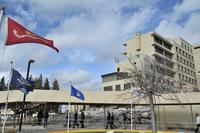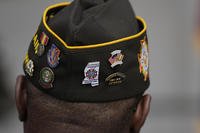Former Defense Secretary Robert Gates is still puzzled by retired Army Gen. Stanley McChrystal's refusal to fight for his job as coalition commander in Afghanistan.
In his book "Duty: Memoirs Of A Secretary At War," and in interviews promoting the book, Gates said he encouraged McChrystal to push back against the "bum's rush" he was getting from the White House staff and Vice President Joe Biden after Rolling Stone published a profile on him titled "The Runaway General."
"I wish Stan had given me something to defend him with," Gates said last month at a National Constitutional Center forum in Philadelphia. "It was like he was at West Point again and it was just: ‘No excuses, Sir,' " Gates said.
Gates speculated that McChrystal "didn't want to throw his staff under the bus" and decided to take full responsibility. In effect, "McChrystal handed his opponents in the White House the ammunition to get rid of him," Gates said.
In a White House showdown that McChrystal later described as "short and professional," McChrystal offered his resignation and it was quickly accepted by President Obama. The decision had already been made to replace McChrystal as the U.S. commander in Afghanistan with Army Gen. David Petraeus.
McChrystal's fall did not come without warning. He had achieved near-legendary status in the military, both for his ascetic lifestyle and his Special Forces leadership in Iraq.
McChrystal "was perhaps the finest warrior and leader of men in combat I had ever met," Gates said in his book, but dealing with McChrystal also posed one of the "unexpected challenges" he would face as defense secretary.
McChrystal was one of the subjects of an investigation into the friendly fire death in Afghanistan of Army Cpl. Pat Tillman, the former pro football player. McChrystal had signed off on a Silver Star for Tillman with a citation that made no mention of friendly fire, infuriating the Tillman family.
Gates argued for Senate approval of a fourth star for McChrystal against the initial opposition of Sen. John McCain, R-Ariz.
Gates wrote that he also repeatedly had to defend McChrystal's tactics and strategy in Afghanistan, and his recommendations on troop levels. Through 2009, "the gap between the White House and senior defense leaders had become a chasm," Gates wrote.
Gates said that the Afghan strategy and McChrystal's management of it were already under heavy pressure from Obama's staff and Biden in particular.
"We were barely holding our own," Gates wrote. "Then disaster struck" with the release of the Rolling Stone article in June 2010.
The article described a night in a Paris bar with McChrystal and his staff where a staff member mocked the vice president, questioned Obama's commitment to the war, and then-National Security Adviser Jim Jones, the retired Marine commandant, was called "a clown."
McChrystal's office declined comment on Gates' account of the resignation, but McChrystal wrote in his own book "My Share of The Task" that an aide woke him at 2 a.m. in Kabul to tell him of the Rolling Stone piece: "Sir, we have a problem. The Rolling Stone article is out and it's really bad."
McChrystal immediately phoned Gates, who said in his book that his first question was "What the [expletive] were you thinking?"
At a White House meeting the next day, Gates said Obama told him: "I'm leaning toward relieving McChrystal."
McChrystal flew back to Washington to offer his resignation to Obama, but Gates said he first urged Obama "to tell Stan he had one last chance." It was not to be.
"But to this day I believe he was given the bum's rush by Biden, White House staff and NSC [National Security Council] who harbored deep resentment toward his unyielding advocacy the previous fall of counterinsurgency and a huge troop surge in Afghanistan," Gates wrote.
McChrystal was more accepting of his fate, while still disagreeing with the thrust of the Rolling Stone article.
McChrystal wrote that he agreed to allow the Rolling Stone reporter, the late Michael Hastings, access to "provide transparency into how my command team operated." Instead, the piece described "a hard driving general, a struggling U.S. policy and attributed a number of unacceptable comments to my command team," McChrystal wrote.
"Regardless of how I judged the story for fairness or accuracy, the responsibility was mine," McChrystal wrote. Following the meeting with Obama, McChrystal said he immediately went to his wife, Annie, and "I told her that our life in the Army was over."
Eight months after his resignation in June 2011, McChrystal and the White House sought to heal the rift. McChrystal accepted an unpaid advisory role to the White House "Joining Forces" initiative led by First Lady Michelle Obama and Dr. Jill Biden, wife of Vice President Biden, to help troops and their families, and aid in their adjustment to civilian life.
At the time, Mrs. Obama called McChrystal "a unique and powerful advocate for the millions of Americans who serve our country selflessly."
McChrystal told the New York Times that his return to public service "sends a strong, positive message that this is about taking care of our people."



























